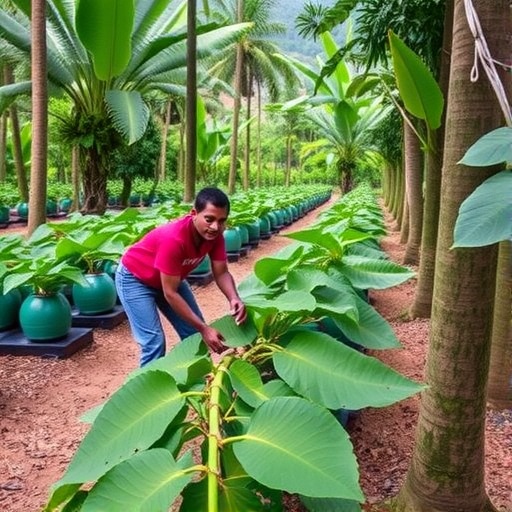In the heart of Colombia’s lush landscapes, cacao farming has emerged as a beacon of sustainable agricultural practice, promising not only economic benefits but also a pathway to environmental conservation. The recent study titled “Toward understanding the scaling out of sustainable land use systems in Colombia: integrating case study insights and national pathways design for cacao farming,” authors including Del Río Duque and Löhr, alongside Pérez-Lora, delves deeply into the intricacies of this transformative agricultural sector. The study is a comprehensive exploration that seeks to unify micro-level case studies with broader national strategies, paving the way for a sustainable future in cacao production.
Cacao, the foundation for chocolate production, has a rich history in Colombia that dates back centuries. Today, however, its cultivation must navigate the complexities of modern agricultural demands and sustainability challenges. The study reveals that the conservation of biodiversity is interwoven with cacao farming practices. Utilizing techniques that promote agroforestry and organic methods, farmers can enhance ecosystem services while ensuring the integrity of their land for future generations. Moreover, the authors assert that by adopting these sustainable practices, cacao farmers can still achieve competitive yields, dispelling the myth that sustainability equates to lower productivity.
The researchers utilize a multidisciplinary approach, integrating insights from environmental science, socio-economic analysis, and agricultural policy. Their findings signal a critical juncture for agronomists and policymakers alike. By examining various case studies from different regions within Colombia, the team highlights how local adaptations of sustainable practices can serve as templates for broader applications. The versatility of cacao farming means that methodologies can be tailored to fit diverse climatic, soil, and social conditions, enabling farmers to maximize both sustainability and output.
The analysis extends beyond agricultural practices; it also dives into the socio-economic dimensions of cacao farming. One of the standout revelations from the study is the role of community engagement and education in fostering successful sustainable practices. It is emphasized that empowering farmers through training programs and access to resources is paramount. This holistic understanding of cacao farming not only boosts the local economy but also cultivates a sense of pride among farmers, who become stewards of their land.
In addressing the scalability of these sustainable practices, the authors propose innovative national strategies that could be implemented to encourage wider adoption. Government interventions, including incentives for sustainable





